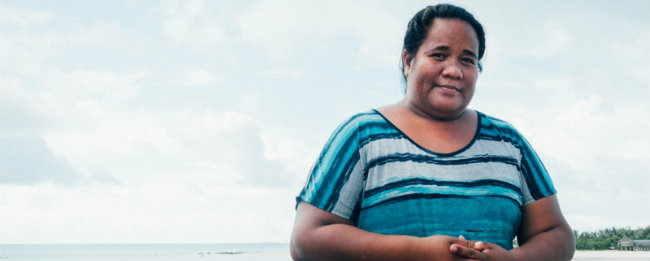First Minister urged to commit to ambitious new Scottish climate targets ahead of attending global climate talks in Germany.
People in low and lower-middle income countries were five times more likely to be forced from their homes by “sudden-onset” weather disasters, like floods and storms, than people in richer countries, according to Oxfam.
In Uprooted by Climate Change, Oxfam illustrates the ruthless inequality of climate change; poor communities, whose greenhouse gas emissions are barely measurable, are at a much higher risk of displacement than those who are doing the most harm to the environment.
Data from 2008 to 2016 shows that on average, extreme weather displaced 14 million people in these countries, compared to approximately 1 million in high-income countries. In total, 23.5 million people were newly displaced in 2016 by extreme weather.
This total is likely an understatement because these numbers don’t account for “slow-onset” disasters like drought and sea-level rise.
Oxfam also estimates around 1.9 million people were displaced due to droughts in the first nine months of 2017 alone.
While not all extreme weather events are linked to climate change, scientists are clear that it is increasing the risk of more frequent and intense weather-related hazards. This, combined with the growing number of people living in exposed areas and the underlying vulnerability of populations, all contribute to the rise in the number of people forced to leave their homes.
Oxfam’s report also shows how people on the frontlines of climate change are dealing with the threat of displacement. For communities in Kiribati, which lies less than three metres above sea level, relocation is a last resort.
“My great hope for my country is that it remains, existing on the map,” said Claire Anterea, a local environmental leader and Oxfam partner in Kiribati. “I hope that my people remain here, living with the surroundings we’re familiar with, where our parents and ancestors are buried.”
Oxfam’s new report is being released ahead of the United Nation’s climate conference, COP 23, which kicks off on the 6th of November in Bonn, Germany.
First Minister Nicola Sturgeon is set to join other world leaders in Bonn to discuss next steps for governments to implement the Paris Climate Change Agreement.
During the Paris COP in 2015, the First Minister vowed to champion climate justice as a global priority. Oxfam Scotland is now calling on the First Minister to live up to her promise by setting a target of zero net emissions for 2050 in the Scottish Government’s forthcoming Climate Change Bill.
The call. which is backed by the coalition Stop Climate Chaos Scotland, would ensure Scotland’s targets are consistent with the goal of limiting global warming to 1.5 degrees Celsius. A zero-net emission target would mean Scotland would only emit into the atmosphere what we can remove.
The Scottish Government’s current proposal is for a reduction in emissions of only 90% by 2050.
Lisa Stewart, Campaigns and Communications Manager at Oxfam Scotland, said: “Around the world, climate change is eating away shores and flooding homes. It’s leaving farmland bone-dry, shattering the lives of millions who did virtually nothing to cause it. It’s unconscionable to leave poor communities alone to deal with disasters they did not create.
“If we’re going to tackle this terrifying global reality and stop more people being forced from their homes, then we need our leaders to deliver bold and decisive action at national level.
“The First Minister has promised to show global leadership on climate change and now she must live up to her words by committing Scotland to a target of zero net emissions. Only a zero-carbon future can stop communities and countries from being wiped off the map.
“Scotland must send a clear message ahead of these talks that we reject any backs-sliding on climate change and, in doing so, the First Minister has the opportunity to cement Scotland’s reputation on climate justice whilst demonstrating substantial global leadership.”
—– ENDS —–
For more information please contact Rebecca Lozza, Media and Communications Officer, Oxfam Scotland, on 0141 285 8875 / 07880785159 or RLozza1@Oxfam.org.uk
Notes to Editors:
- Copies of the full report available on request.
-
Figures for 2008-16 are based on data from the Internal Displacement Monitoring Centre’s full dataset for disaster related displacement, and cover all extreme weather events not just those where a link to climate change has been established.
-
Oxfam is calling on government leaders meeting in Bonn to deliver:
- Steeper emission cuts: Countries must agree to make next year’s “Facilitative Dialogue” a crucial moment to deepen emission cuts to strive to limit global warming to 1.5 degrees Celsius.
- “Loss and damage” finance: Communities on the climate frontlines can’t be the only ones picking up the tab. Parties should make progress on how to provide relief to those who need it most.
- Finance for climate change mitigation and adaptation: Rich countries still have a long way to go to meet the finance goals enshrined in the Paris Agreement and must show how they’ll get there.
- A united front in this fight: Any effort by the Trump administration in the United States to weaken the Paris Agreement must be soundly rejected by all parties.
- International protection: The UN’s “global compacts” on refugees and migrants, due next year, should include protections for people forced across borders by natural disasters.
-
Oxfam is calling on government leaders meeting in Bonn to deliver:
